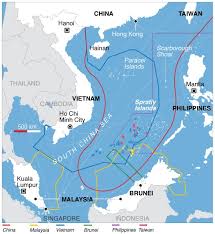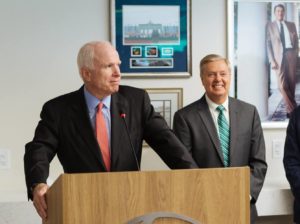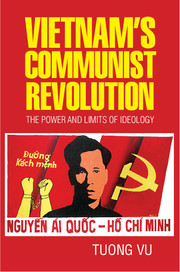
Credit: IRI
Senator John McCain’s legacy is secure in terms of US-Vietnam reconciliation, but it falls to us to  realize his commitment to realizing democracy in Vietnam, writes Dr. Cu Huy Ha Vu (right), a former Vietnamese political prisoner.
realize his commitment to realizing democracy in Vietnam, writes Dr. Cu Huy Ha Vu (right), a former Vietnamese political prisoner.
I have published many articles on Vietnam – US relations, but this is the first time I write about an individual who personified that relationship, For Americans, the late Senator is remembered as a hero, as a prisoner of war of North Vietnam for five-and-a-half years, after his Skyhawk was shot down in Hanoi on October 26, 1967 when he was making his 23rd bombing of Vietnam’s capital. Like other American pilots imprisoned in the central prison of Hoa Lo, he called it the Hanoi Hilton.
To the Vietnamese, this ex-POW was best remembered as a leading statesman for healing the wounds of war, emerging as a symbol of noble reconciliation for his work on normalizing and promoting bilateral relations,.
To me personally, Senator McCain left a special legacy in two respects. First, establishing military cooperation with Vietnam in order to counter forcible Chinese territorial expansion; second, promoting human rights and the rule of law in Vietnam – two areas to which I have totally committed myself for more than ten years.
Military cooperation
 In 2010, immediately after China submitted to the UN Secretary-General a map claiming 80% of the South China Sea, I said in a VOA interviews that, “to successfully defend the Spratly Islands (left) in particular, its territorial integrity in general, against all Chinese military attacks and thereby safeguard its independence, Vietnam must build a military alliance with the United States.”
In 2010, immediately after China submitted to the UN Secretary-General a map claiming 80% of the South China Sea, I said in a VOA interviews that, “to successfully defend the Spratly Islands (left) in particular, its territorial integrity in general, against all Chinese military attacks and thereby safeguard its independence, Vietnam must build a military alliance with the United States.”
“This military superpower is the only nation having a policy of stifling China’s maritime expansion with the presence of the 7th fleet in the Pacific,” I added. ‘On the US side, a military alliance with Vietnam would allow them to complete their East Asian military strategy.”
On returning from Southeast Asia in June, 2011, Senator McCain concurred, stating in a speech to the Maritime Security in South China Sea conference that the U.S. should help Southeast Asia nations strengthen their naval power to deal with a warlike China, which was greedily asserting groundless claims in the South China Sea.
In order to materialize that vision, John McCain worked tremendously to lift the US arms embargo that had been imposed since the end of the Vietnam war.
“We will need to enable Vietnam’s ability to contribute to the maritime space by finally removing the prohibition on the sale of lethal military equipment to the Government of Vietnam,” said Senator McCain, as Chairman of the US Senate Armed Services Committee, just before President Barack Obama’s visit to Vietnam in May 2016.

“This symbolic ban of weapon sales is a product of our past history and an inhibitor of our future relationship,” he added. “Vietnam should be allowed to purchase land and sea-based platforms that facilitate the Vietnamese armed forces’ ability to operate more effectively on, above, and within its territorial waters.”
President Obama lifted the arms embargo during his visit to Vietnam. Undoubtedly, this event turned the old foes into new friends.
On May 20, 2016 Senator McCain sent a letter to General Nguyen Phu Trong, Secretary General of Vietnam’s ruling Communist Party and Secretary of the Central Military Commission, expressing his hope that the US Pacific Fleet, of which his father had been Commander, and the Vietnamese People’s Navy would strengthen cooperation, inviting the VPN to future Rim of the Pacific international exercises off of Hawaii, and conducting more officer exchanges.
 Under This impetus, the State Department’s Foreign Military Financing (FMF) program, together with the Pentagon’s New Maritime Security Initiative, allows improved surveillance in the territorial waters and airspace of Vietnam, the Philippines, Malaysia, Indonesia, and Thailand. Under FMF, the United States would supply 18 Metal Shark patrol boats to Vietnam, as well as training and maritime law enforcement equipment to the Vietnam Coast Guard.
Under This impetus, the State Department’s Foreign Military Financing (FMF) program, together with the Pentagon’s New Maritime Security Initiative, allows improved surveillance in the territorial waters and airspace of Vietnam, the Philippines, Malaysia, Indonesia, and Thailand. Under FMF, the United States would supply 18 Metal Shark patrol boats to Vietnam, as well as training and maritime law enforcement equipment to the Vietnam Coast Guard.
Senator McCain’s last visit to Vietnam was on June 2, 2017, when he joined Senators Christopher Coons and John Barrasso visiting sailors on the USS John S. McCain anchored in Vietnam’s Cam Ranh International Port.
Promoting human rights

Credit: Human Rights Watch
In 2010, I was arrested (right) by the Vietnamese government and sentenced to 7 years imprisonment followed by 3 years of probation for “Crime of Conducting Propaganda against the State of the Socialist Republic of Vietnam.”
After arriving in America directly from prison in 2014, I met Senator McCain when he attended Vietnam Human Rights Day held in the US Congress on May 11, 2015. I told him: “Senator, you are a famous prisoner of war. And I am a human rights prisoner.” He listened to me with rapt attention. “You are a special person. You are respected by both the Vietnamese people including democracy and human rights activists and the Vietnam government,” I continued. “Therefore, please use your prestige with the Vietnamese government to ask them to stop repressing those who only use freedom of speech and promote the rule of law.” He held my hand tightly, and said, “I promise.”
 And he made good on that promise.
And he made good on that promise.
“Further steps to ease, and ultimately lift, the prohibition (on the sale of lethal military equipment to Vietnam) would require the Government of Vietnam to take significant and sustained steps to protect human rights, including releases of prisoners of conscience and legal reforms,” he said in a July 7, 2015 statement on the occasion of CPV General Secretary Nguyen Phu Trong’s visit to the United States. “That should be our goal, and we should work together to achieve it as soon as possible for the benefit of both of our nations.”
 In recent years, he used his official Vietnam visits to promote human rights and the rule of law, confirming National Endowment for Democracy president Carl Gershman’s description of him as ”one of the great freedom fighters.” In addition to talking directly with Vietnamese leaders on these issues, he met with civil and human rights activists and former prisoners of conscience to bolster their morale.
In recent years, he used his official Vietnam visits to promote human rights and the rule of law, confirming National Endowment for Democracy president Carl Gershman’s description of him as ”one of the great freedom fighters.” In addition to talking directly with Vietnamese leaders on these issues, he met with civil and human rights activists and former prisoners of conscience to bolster their morale.
The senator’s commitment to promoting democracy in Vietnam was also evident in his relationship with the exiled North Vietnamese colonel Bui Tin (see photo here and video below), who “had a prominent role in the Vietnam War’s final moments but later fled the country and became an unlikely critic of its ruling Communist Party,” The New York Times notes in a recent obituary:
In 1991, Colonel Tin traveled to Washington and testified before a Senate committee that dealt with American prisoners of war. He also met with Senator John McCain of Arizona, a former prisoner of war in Hanoi, to discuss what the senator later described as their “mutual interest in promoting democracy in Vietnam.” After Colonel Tin spoke to the committee, Mr. McCain approached him and stretched out his palm for a handshake. He got a hug instead.
 “His exile embodies the tragedy of Vietnam, and Vietnamese intellectuals in particular,” said Tuong Vu, the author of “Vietnam’s Communist Revolution: The Power and Limits of Ideology,” “as they found themselves in the stranglehold of a corrupt and violent regime that at one point appeared to represent their aspirations.”
“His exile embodies the tragedy of Vietnam, and Vietnamese intellectuals in particular,” said Tuong Vu, the author of “Vietnam’s Communist Revolution: The Power and Limits of Ideology,” “as they found themselves in the stranglehold of a corrupt and violent regime that at one point appeared to represent their aspirations.”
John McCain shared Bui Tin’s conviction that Vietnam’s Communist authorities put self-interest and ideological dogma before citizens’ needs and aspirations.
“Bureaucracy, irresponsibility, egoism, corruption and fraud are becoming entrenched under an insolent reign of privileges and prerogatives,” he said in one broadcast. In a subsequent column for The Washington Post, he wrote: “The tragic irony of this situation is that the Communists have finished what America’s military machine only partly did during the war. They have crushed Vietnam, thereby squandering the achievement for which a million of our troops and countless numbers of civilians sacrificed their lives.”
After the war ended on April 30, 1975, the Hanoi government erected a sculpture on the edge of Hanoi’s Truc Bach Lake, depicting the downing of navy pilot John McCain. During his visits to Vietnam, McCain led US senators and friends to the place and showed his pride on it. When learning of his death, many Vietnamese paid him tribute to at the site of the sculpture.
The Vietnam War generation from both sides will eventually bid farewell to life on this earth. But I firmly believe that reconciliation and friendship with Vietnam, of which John McCain, and other Vietnam veteran politicians such as John Kerry and Jim Webb, have laid a solid foundation, will worthily serve the common good of the two peoples.
Now that the Senator’s first legacy of US-Vietnam reconciliation and cooperation is secure, it remains to us to attain the second – establishing human rights and the rule of law in Vietnam.
Cu Huy Ha Vu, Ph.D. in Law, former Vietnamese political prisoner.







